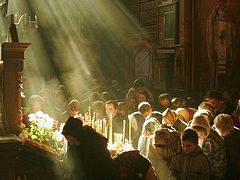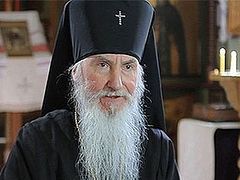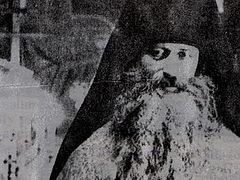Perhaps the most striking thing about human beings is that we don’t actually come into existence by ourselves. There are parents (two of them when the laws of biology are allowed to work). The parents themselves are points of contact to a much larger world of the family and the culture itself. Human beings do not come without cultures. In a relatively short time, we acquire language and a host of other things from this culture around us. Concepts, beliefs, understandings will all be engaged only in a cultural context. There is something individual about us, but mostly in the abstract. It is not just other humans that we need: we cannot exist without bacteria. We have more of them in our gut than the number of cells in our bodies. We do not exist alone. In the story of our creation, we were told, “It is not good for the man to be alone.” And so we are “male and female.” How is it that our lives exist only in such a shared manner and yet many want to image that our salvation is entirely individual?
No one is saved as an individual.
There is no historical account of a Christianity that is not also the Church. Christianity must be the Church because that alone truly reflects the truth of our humanity. Jesus never taught a salvation that was individualized. Instead, He prays:
“That they all may be one, as You, Father, are in Me, and I in You; that they also may be one in Us…”(Joh 17:21)
The “one” that we are to become is not a property that can belong to an individual. Alone, we are not one. Alone, we are not yet anything.
The language we use with regard to God bears a similar understanding. Christ reveals the Father by a name that can have no meaning by itself. “Father” is always “Father of…” The same is true of the name “Son.” “Spirit” is always “Spirit of” (particularly in the original languages). God makes Himself known to us in the mystery of Father, Son, and Holy Spirit.
Nothing is more bothersome in our existence than the existence of others. Jean-Paul Sartre famously said, “Hell is other people,” (indicating that you would not want to invite him to a party). Both love and hate require other people. We do nothing alone. We might imagine ourselves to be doing something alone, but within us are the presence of many others. The voice in our head speaks a language, learned only from others. When we speak, they speak as well. Our existence is never truly individual.
And so, our salvation is never truly individual. The modern world caters to an imaginary individual, something invented by its own mythology. It speaks of liberty without responsibility and freedom without communion. Various contemporary Christianities have unintentionally become purveyors of this concept, and have created an account of salvation that isolates the believer, who is told that they can have Christ without sacrament and without the Church. They offer something that Christ Himself never offered.
God has united Himself to our humanity and become a partaker of our history and our culture. There is no Jesus of Nazareth who is not a Jew, who does not speak Aramaic, who was not born of Mary. The Second Person of the Holy Trinity enters time at the word of an angel to the Virgin. Not until God enters her womb (taking flesh of the Virgin) can we say His name is “Jesus.” That name is now exalted because it is now the name of the Son of God. But the Son of God now remains and abides fully human as well as fully God. To be fully human is to have a context.
Christ is not some sort of “transcendent man,” incarnate in all places, times and cultures. To know Him is also to know a Jew, a male, a Galilean. All those things (as do all things human) have a shared characteristic within them and have no meaning except in reference to other humans.
The human life is always a corporate life. Though each person has some measure of freedom, we remain dependent upon others. That someone should become a hermit and have no more contact with others does not erase the fact that their existence remains dependent. We are not self-creating nor self-sustaining.
The interdependent reality of our lives has traditionally been expressed in the communion of saints within the historic Christian Church. We cannot speak of Christ’s humanity apart from the Virgin Mary, and so (as a representative of us all) she is always honored in the life of the Church (just as she is honored within the gospels).
The unchurched, non-sacramental evolution of contemporary Christianity follows the track of modern culture’s portrayal of human beings as atomistic individuals. Catholics and Orthodox frequently hear others assert, “I don’t need a priest. I can go straight to God.” Of course, neither Catholics nor Orthodox say that you cannot “go straight” to God. However, they both know that no one goes alone. We are assisted by the heavenly hosts, our guardian angels, the saints, our brothers and sisters in Christ, and, yes, the sacramental priesthood of the Church who exist in the line of the Apostles. That is the universe and the faith as God gave them to us. Modernity imagines that everything can be improved, including God.
This, however, is anti-human, a re-imagining of our nature and a re-configuration of salvation. Letters written to Churches are taken as personal mail from God. In ignorance, contemporary readers remove the Scriptures from the Church, from history and from the tradition that produced them and turn them into texts that justify modernity and every bizarre turn of the culture.
The gospel is not the story of individual salvation. It is, above all, the “gathering together into one all things in Christ Jesus.” The drive towards independence and the diminishment of our common life is a drive that is moving in a direction opposite from the “mystery of [God’s] will, according to His good pleasure which He purposed in Himself” (Eph 1:9).
Modernity is on a collision course with the universe. My money is on the universe.





His intention was to speak the truth clearly.
Relative to your last point: perhaps you have some documents, some historical evidence that that belief existed in the 2nd, or 4th, or 8th century? I've never seen it myself.
Your position is quite new, probably less than 150 years old. The actual Church has not held such a simplistic view to my knowledge.